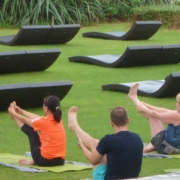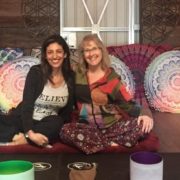Does Yoga Change Our Brain and Improve Memory as We Age?
At any age, in today’s fast-paced world, we may be challenged by our ability to maintain our focus long enough to actually create a memory worth remembering! I hear myself saying almost daily “Thank God for Google” or I wouldn’t be able to remember the name of the new restaurant in town I saw on my way home from the office to tell my husband or the movie I saw last week to tell my friends. We have come to rely more on our electronic devices with all of the available apps to assist in reminding us of where we need to be and when, to keep track of our finances and when to pay our bills, and to prompt us so we don’t forget a birthday or anniversary. There are even apps to remind you to get up from your desk every hour and to stop whatever you are doing and simply breathe!
As we age, the brain does change and it is not unusual for all of us to experience some level of memory loss, specifically working memory. This expected memory loss due to aging does not necessarily mean we are developing dementia. However, with an increasingly older population, it is important to understand ways to support our brains and our memories to maintain our mind-body health. A new research study has shown that yoga may be one of those ways!
In this research, the intention was to focus on the brain’s cortical thickness, which has been shown to decline with age and is associated with executive functioning relating to memory and attention. With the assistance of MRI scans, the results showed an increase in the cortical thickness, specifically in the left prefrontal cortex which supports working memory and cognitive flexibility, in the older women who had practiced yoga for at least 8 years. The researchers suggest that it is the unique contemplative or attentional component that is an integral part of yoga that differentiates it from other conventional forms of physical fitness exercise. So even if you consider yourself active and regularly participate in other forms of physical movement, your brain may not be getting the same boost as it would from integrating yoga into your self-care routine.
This study is important for people of all ages, not only those of us that may believe we have reached the peak of our life span. Yoga comes in many different forms and styles and is not one size fits all. Yoga ranges from very little movement at all, such as with yoga Nidra or Restorative Yoga to the other end of the spectrum, with continuous movement, such as with a Vinyasa or Ashtanga class. So no matter how old you are in the present moment, it is a great time to explore this practice and find a style that works for you. It is never too soon or too late to integrate yoga into your overall preventive health care efforts. Your body and mind will thank you now and well into the future!











Leave a Reply
Want to join the discussion?Feel free to contribute!